In China, the seven-day holiday following the National Day on 1 October is known as the Golden Week, because it is the longest national holiday aside from the Chinese New Year. This year, as many people took the opportunity to travel with their families or friends, more than 100 people from across China, including myself, chose instead to gather at Yuquan Monastery in Dangyang, Hubei Province, for a seven-day meditation retreat. Our group, aged between 16 and 60, included parents with children as well as couples.
Yuquan Monastery (玉泉寺), literally “Jade Spring Monastery,” was constructed in 528 during the reign of Emperor Wu of the Liang dynasty. Since then, the monastery has received continuous imperial patronage and produced more than 120 eminent monks, according to historical records. The most influential among them were Zhiyi (智顗, 538–97), founder of the Tiantai school, and Shenxiu (神秀, 606–706), founder of the Northern Chan school. For that reason, Yuquan Monastery is regarded as the ancestral temple of both the Tiantai and Northern Chan schools of Chinese Buddhism.
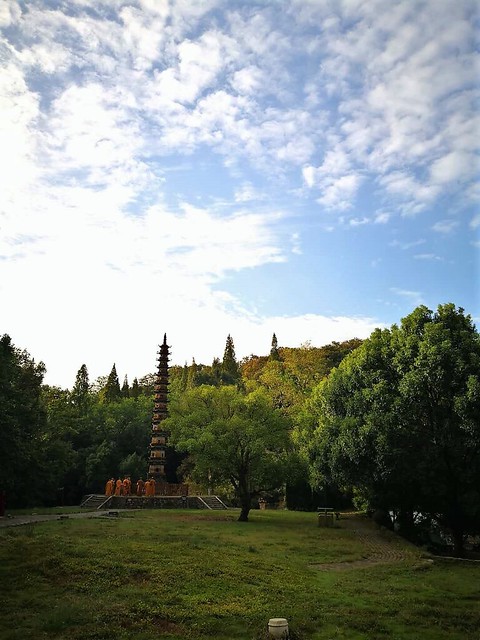
Image courtesy of the author
The current abbot of Yuquan Monastery, Venerable Daowei (道偉), was tonsured at the age of 18 at Xuefeng Chongsheng Chan Monastery (雪峰祟聖禪寺) in Fujian Province. For more than two decades he trained in the Buddhist classics and meditation of both the Mahayana and Theravada traditions. Having studied the Abhidharmakosha and Yogachara texts in China, he was selected by the Chinese Buddhist Academy for further studies in Japan, where he obtained a PhD from Aichi Gakuin University. He also made several trips to Myanmar and practiced meditation under the tutelage of Master U Pandita (1921–2016). Last year, Ven. Daowei launched meditation retreat programs at Yuquan Monastery to lead people to liberation by improving their quality of life, purifying their minds, and balancing mind and body.
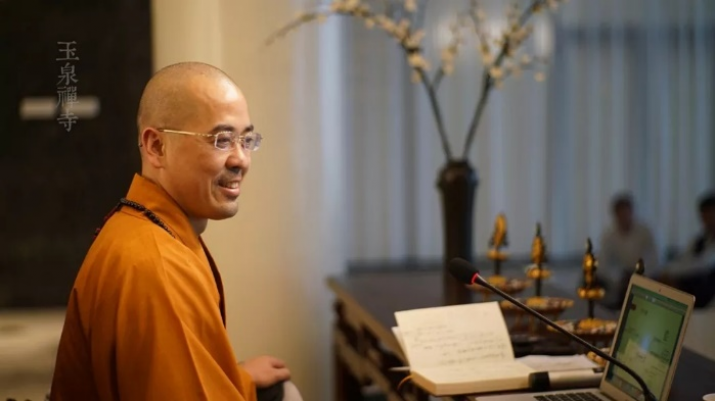
In recent times, there has been a rapidly growing need for spirituality in China. Various types of retreat programs based on different beliefs and theories have been organized across the country. At Yuquan Monastery, it was the fifth retreat since the first one had been organized last year, and it did not take long for the monastery to establish itself as one of the most respected meditation centers in the country. It is said that this time more than 700 people applied for the program. Although most people who come to the retreat are Buddhists or are interested in Buddhism, the program is open to people of all faiths. Taking a humanistic approach, the program is intended to empower people and to help them live better lives in the secular realm with the benefits of meditation.
The benefits of meditation are widely understood as helping to improve our mental focus and our mental health. In China, various meditation methods, described as mingxiang (冥想, deep contemplation), have been popularized in recent years, mainly by wellness professionals. However, few people in China are aware that meditation has a long history, and was practised and advocated by the Buddha himself, as Ven. Daowei reminded us in his first lecture.
Indeed, we all know that the Buddha attained enlightenment under the Bodhi Tree, but we often neglect the fact that his enlightenment was realized through meditation. That is why many Buddha statues and images are in meditative postures. As early as the sixth century, the Chinese had already compiled systematic and comprehensive treatises on meditation, a practice called dazuo (打坐) or zuochan (坐禪, sitting dhyāna) by the Buddhist community. The methods and doctrines of zhiguan chan (止観禪, śamatha-vipaśyanā dhyāna) laid out by the aforementioned master Zhiyi have been consulted by the lay and monastic sangha from all Buddhist schools up to today. The purpose of meditation is beyond the concerns of the body. It is a path one takes to find truth, answering questions such as, “Who am I?” “Why am I here?” and “Where am I going?”
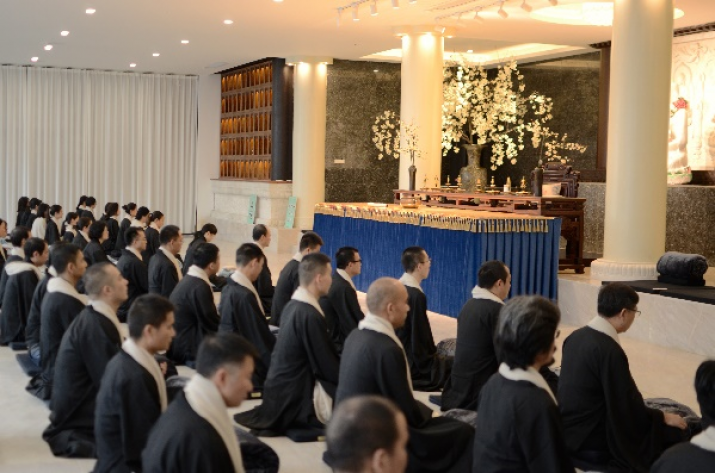
While teaching meditation by following authentic and ancient methods, the Yuquan Monastery retreat also aims to create a pristine environment to calm the mind and cultivate insight. For seven days, there was no talking, no digital devices, and no food after noon. Each morning, we would rise at 4am, and attend a prayer and chanting session with the monastics at 4:30am. Throughout the day, we had alternating sessions of sitting meditation and walking meditation, four hours each in total. In the evening, we recited the Diamond Sutra, which was followed by a lecture from Ven. Daowei. Eventually, at 10:30pm, the day would come to an end.
At first sight, the program might seem intimidating and unnecessarily strict. However, we gradually came to realize that all the rules were thoughtfully implemented to protect us from distraction and to nurture our spirituality. For instance, most people are convinced that verbal communication is of vital importance in any type of relationship. However, the retreat showed us an opposite scenario. When we did not talk, we gave full attention to our own practice and remained courteous to others. From day five onward, Ven. Daowei would answer our questions in smaller groups. Once our mouths were opened after many days of silence, most of us could not resist talking in private. However, the verbal exchanges we had were mostly meaningless gossip or bragging, which also caused conflicts. Ven. Daowei explained that speech, as an intense way of communication, has a contentious nature.
Throughout the retreat, we were granted precious time to withdraw from phenomena and old habits, and to reflect on the nature of life. Before handing in our digital devices, we were all busy with our phones and computers, not because we wanted to tell others anything urgent, but because we were worried that others could not find us. Scientific research has proven that we get pleasure from social media due to the dopamine produced in our brain when we receive new messages, which has nothing to do with the content of messages. In fact, when we desperately checked our devices afteren sev days, we realized that we had not missed much. What is on the Internet is not always reality. It is a fantasized version of human existence that is drifting further and further away from reality. It is alarming to apprehend how much time we waste watching other people, with the advance of technology.
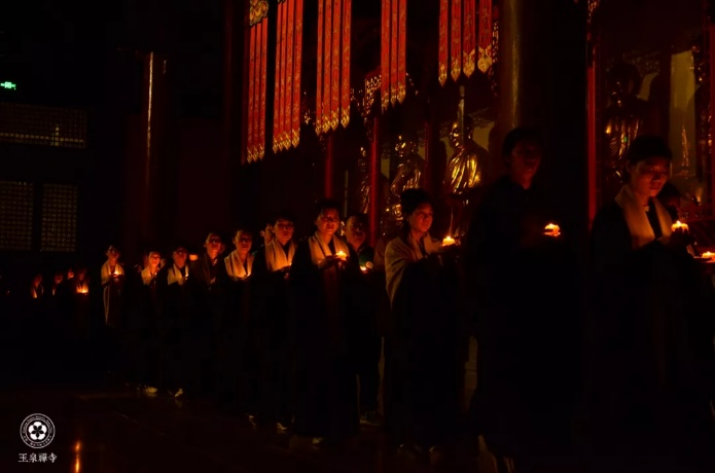
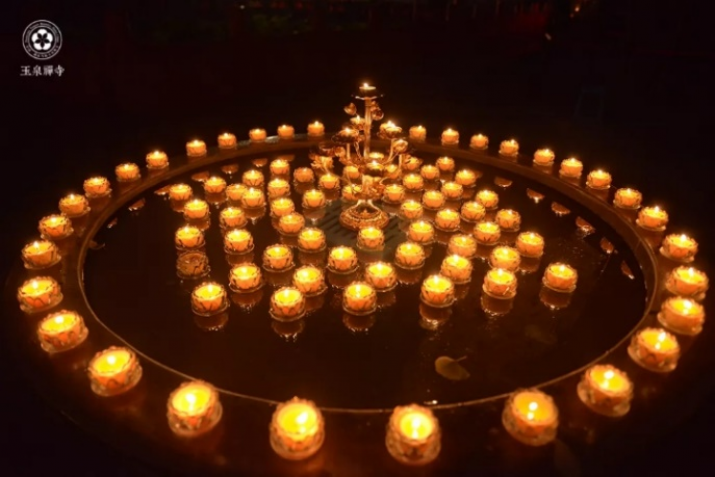
My most beautiful experience during the retreat was from the meditation itself, through observing my own breaths and physical sensations. Day by day, I felt how both my body and my mind became clearer and clearer. Inhale, exhale, the pain appeared and disappeared. In stillness, I had a glimpse of how everything changes, how “me” is insubstantial, and how my heart is connected to Buddha-nature. At times, when I opened my eyes after an hour of meditation, I had tears in my eyes. Ajahn Chah (1918–92) expounded that the Dharma is not found in Buddhist texts, it is in the practice of meditation. With more than 20 years of practice, Ven. Daowei told me that meditation is what makes the various Buddhist schools Buddhist, regardless of the language of their Canon or their geographical location.
The meditation retreat is free of charge, although donations are welcomed. Led by monastics at Yuquan Monastery, each retreat is efficiently managed by lay volunteers, many of whom have benefited from previous programs. Out of selfless compassion and great wisdom, the monastics and laity will continue to organize more meditation retreats at Yuquan Monastery. They also plan to promote meditation training in first-tier cities, where people are more educated and affluent, but suffer more, both physically and mentally.











